A new Europe-wide code of research conduct has ordered academics and journals to treat negative experimental results as being equally worthy of publication as positive ones.
There have been long-standing concerns that, when scientists fail to find evidence for an effect they expected or wanted, publishing the results is seen as uninteresting or more difficult, particularly in journals seen as prestigious.
By binning experimental results because they are negative, researchers fail to alert their colleagues to false leads, wasting lab time, and experiments that challenge well-known positive results go unpublished, critics have argued.
The new European Code of Conduct for Research Integrity frames the bias against negative results as an issue of research conduct, stipulating that “authors and publishers [must] consider negative results to be as valid as positive findings for publication and dissemination”.
It has been drawn up by All European Academies (Allea), a network of academic organisations including the British Academy, Germany's Leopoldina and the French Académie des Sciences.
The new code will apply to researchers using grants from the European Union’s Horizon 2020 programme, but it is hoped that it can also be adopted as a model by other organisations.
It maintains many of the stipulations made by a previous version, created in 2011, although it has been slimmed down. But this earlier code does not mention the issue of negative results.
The new code also puts more emphasis on research organisations themselves to prevent and detect misconduct; for example, universities should reward “open and reproducible practices” when it comes to hiring and promoting researchers, it says.
Register to continue
Why register?
- Registration is free and only takes a moment
- Once registered, you can read 3 articles a month
- Sign up for our newsletter
Subscribe
Or subscribe for unlimited access to:
- Unlimited access to news, views, insights & reviews
- Digital editions
- Digital access to THE’s university and college rankings analysis
Already registered or a current subscriber?







